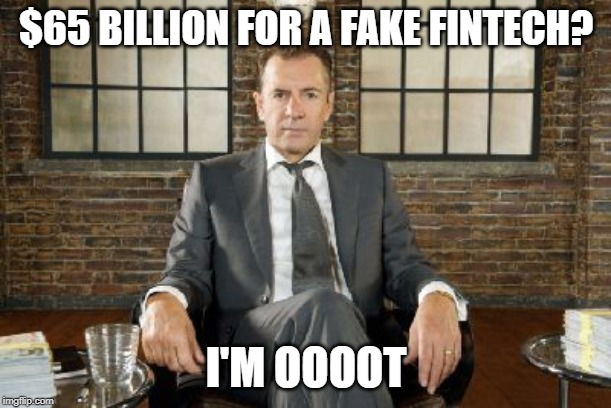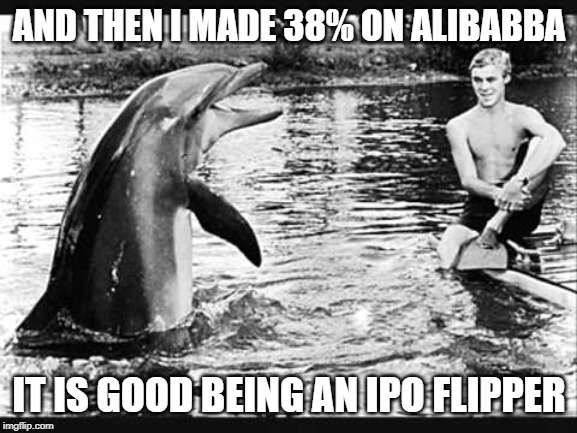IPO's #wework until #wedon't Wild West investing.

Dear Reader,
Does anyone remember Charlie's Angels from the 1970's? Three long haired ladies adventuring across our small screens with hair that never seemed to look out of place. I wondered recently what had happened to the cast and was quite surprised to discover Farrah Fawcett is now the CEO of a company called Wework. Her hair is still amazing after all these years!

Anyway today I wanted to touch on IPOs. To the outsider it is a dark market where vast sums can be made on the day a company comes to market. It is worth looking at whether the hype that surrounds a lot of these companies is really worth the investment in the longer term. Lets have a look at a couple.
Alibaba the Chinese Amazon came to market in 2014 and in its first day of trading it rose 38% and still remains the largest ever IPO ever (168billion).
Etoys came to market in 1999 at 20 USD a share and ended day one at $76. Fast forward two years and the company went bankrupt.
In 2011 Groupon came to town and raised 700 million USD. The shares priced at 20 bucks and just over a year later were trading at 5$. As of today they are 3$.
I am not Sherlock Holmes but something here stinks. The above examples are extremes of course, many IPO's arrive quietly and perform as they should. The question is why do they perform so well at issue then seem to 'decay' almost immediately.
Back in the day I was involved in IPO's for a brief history of time. There is a very funny story I could tell about me and a guy from Goldman Sach's Asset Management at an IPO lunch for a French supermarket chain but I should probably save that for another time.
There is an entire cottage industry in the IPO market. When the open outcry futures pits closed across the world due to the march of the machines there was an army of self employed savvy coal face traders left looking for something exciting to do where fast money could be made. The IPO market provides that in spades.
When a company wants to IPO it hires a bank (or several normally) to represent it to the market. These banks will then do road shows where they ostensibly market to funds and other banks to drum up interest in taking stock at launch. Up until launch day this period is called book building. I am sure you have all seen the news where presenters excitedly say XYZ ipo stock is 15 times over subscribed - effectively there is 15 times more interest than the amount of shares offered.
Sounds amazing doesn't it. 15 times more interest should ensure the stock will fly out the door and generally it does. What this number doesn't show is why it is 15 times oversubscribed. Book building banks are basically just marketing departments. They will tell potential investors that to guarantee some allocations that they will need to apply for a multiple of the amount they actually want. To get 1 million you might have to bid for 10 million.
Now we have the army of 'day traders' who also want a chance of making 38% in one day a la Alibaba. Who wouldn't? They will spend many long lunches developing relationships with issuing desks at banks to get ahead in the queue for allocations. So they will all be bidding for multiples of stock with a view to selling the moment they hear they get any in the IPO. They will also go to every bank involved as leads and apply for allocations thereby inflating the book even more.

I have no issues with any of this. The IPO market is a bit like a cattle auction house. Every day there are new cows. It is a huge industry for all concerned. Fund managers who don't get allocations pre issue are left scrambling to buy at open which is why you see such massive rallies. Not all IPOs go so well. Sometimes everyone is left nursing losses if the fund managers who didnt get allocation decide to stay away at open. The lead banks end up having to hold the shares they have been trying to place at below issue price. The flipper day traders end up selling it below where they got allocated.
If we take UBER as an example
Uber started trading on Friday in an initial public offering that valued the company at $75.5 billion. By the end of day Friday, the stock was trading down 6.7% off the $45 a share, where the company had priced on Thursday night. With a cumulative loss of $655 million, it's the worst first-day dollar loss of a US ipo. Its shares are currently 34$. Someone somewhere has lost a lot of money.
So the key takeaway is should you invest in IPOs? I would say unless you are very actively involved in markets on a day to day basis it is probably a sector to leave to the cowboys and Indians. It is very much like the wild west. It can be axciting and very stressful and you might put capital at risk.
So when you see Farrah Fawcett touting for an IPO that initially was rumoured to make the company worth 65 billion USD. You need to ask yourself the question whether a real estate company that is pretending to be a fintech company is worth a shot even at 20 billion.
I believe there are better longer term investment options out there. In the words of the grumpy scotsman in Dragon's Den. I'm Oot.
Best
Don


